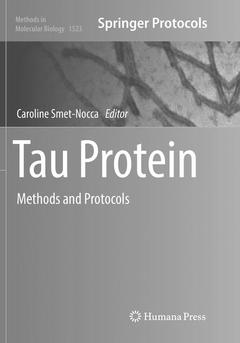Tau Protein, 1st ed. 2017 Methods and Protocols Methods in Molecular Biology Series, Vol. 1523
Coordonnateur : Smet-Nocca Caroline

This detailed volume gathers basic and advanced methods and protocols from in vitro assays and in vivo models to address the molecular and functional aspects of tau physiopathology. Divided into five parts that illustrate the underlying molecular mechanisms of Tau functions and dysfunctions in Alzheimer?s disease and other dementia referred to as tauopathies, this volume discusses timely topics such as: conformational studies of native tau protein and investigation of its physiological function in microtubules binding and tubulin polymerization; in vitro methods of formation and detection of tau oligomers and PHF-like fibrils; characterization and in vitro introduction of post-translational modifications on tau proteins for further functional studies; analytical tools for the detection of tau proteins, their modifications and cellular interactions, and MAPT gene mutations in various biological samples; and cellular and in vivo models for the investigations of tau physiopathology. Written in the highly successful Methods in Molecular Biology series format, chapters include introductions to their respective topics, lists of the necessary materials and reagents, step-by-step, readily reproducible laboratory protocols, and tips on troubleshooting and avoiding known pitfalls.
Practical and cutting-edge, Tau Protein: Methods and Protocols is a valuable resource that addresses the most recent aspects of Alzheimer?s disease research related to Tau protein and state-of-the-art experimental techniques. It targets a broad scientific audience including molecular biologists and biochemists, as well as all researchers interested in exploring the functions of tau proteins.
Conformational Dynamics of Intracellular Tau Protein Revealed by CD and SAXS.- Global Conformation of Tau Protein Mapped by Raman Spectroscopy.- Molecular Dynamics Simulation of Tau Peptides for the Investigation of Conformational Changes Induced by Specific Phosphorylation Patterns.- Tau Interaction with Tubulin and Microtubules: From Purified Proteins to Cells.- X-Ray Structural Study of Amyloid-Like Fibrils of Tau Peptides Bound to Small-Molecule Ligands.- Detection and Quantification Methods for Fibrillar Products of In Vitro Tau Aggregation Assays.- Fourier Transform Infrared (FTIR) Spectroscopy, Ultraviolet Resonance Raman (UVRR) Spectroscopy and Atomic Force Microscopy (AFM) for Study of the Kinetics of Formation and Structural Characterization of Tau Fibrils.- Assays for the Screening and Characterization of Tau Aggregation Inhibitors.- Tau Oligomers as Pathogenic Seeds: Preparation and Propagation In Vitro and In Vivo.- Mass Spectrometry Analysis of Lysine Post-Translational Modifications of Tau Protein from Alzheimer’s Disease Brain.- The Study of Posttranslational Modifications of Tau Protein by Nuclear Magnetic Resonance Spectroscopy: Phosphorylation of Tau Protein by ERK2 Recombinant Kinase and Rat Brain Extract, and Acetylation by Recombinant Creb-Binding Protein.- Tag-Free Semi-Synthesis of Tau Protein.- Production of O-GlcNAc Modified Recombinant Tau in E.coli and Detection of Ser400 O-GlcNAc Tau In Vivo.- Two-Dimensional Electrophoresis Protocols to Analyze the Microtubule-Associated Tau Proteins from Several Biological Sources.- A Simple Method to Avoid Non-Specific Signal When Using Monoclonal Anti-Tau Antibodies in Western Blotting of Mouse Brain Proteins.- Flow Cytometry Analysis and Quantitative Characterization of Tau in Synaptosomes from Alzheimer’s Disease Brains.- In Vivo Microdialysis of Brain Interstitial Fluid for the Determination of Extracellular Tau Levels.- Proximity Ligation Assay: A Tool to Study Endogenous Interactions between Tau and its Neuronal Partners.- Finding MAPT Mutations in Frontotemporal Dementia and Other Tauopathies.- Tracking Tau in Neurons: How to Grow, Fix and Stain Primary Neurons for the Investigation of Tau in All Developmental Stages.- Tracking Tau in Neurons: How to Transfect and Track Exogenous Tau into Primary Neurons.- Image-Based Analysis of Intracellular Tau Aggregation by Using Tau-BiFC Cell Model.- FRET and Flow Cytometry Assays to Measure Proteopathic Seeding Activity in Biological Samples.- In Vivo Imaging of Tau Aggregates in the Mouse Retina.- In Vivo Hyperthermic Stress Model: An Easy Tool to Study the Effects of Oxidative Stress on Neuronal Tau Functionality in Mouse Brain.- Identification of Tau Toxicity Modifiers in the Drosophila Eye.- Regulation of Neurotrophic Factors during Pathogenic Tau-Aggregation: A Detailed Protocol for Double-Labeling mRNA by In Situ Hybridization and Protein Epitopes by Immunohistochemistry.- Pin1 Knockout Mice: A Model for the Study of Tau Pathology in Alzheimer's Disease.
Ouvrage de 432 p.
17.8x25.4 cm
Date de parution : 12-2016
Ouvrage de 432 p.
17.8x25.4 cm


